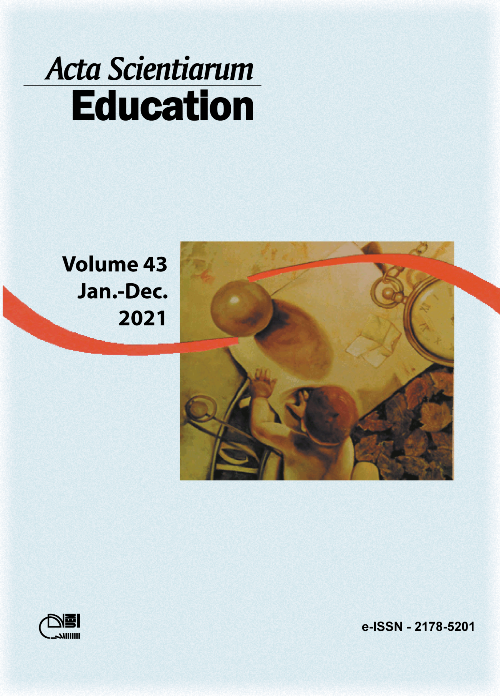Problematic world and the challenges of organizing educational experience in uncertain complex problems
Abstract
This paper aims to present the educational experience organization model according to the pedagogy of the problems of Michel Fabre (1948-), French philosopher, focusing on some questions raised on controversial social issues. Faced with challenges in a problematic world that questions the educational subjects regarding content, mode and time of teaching, and the learning relations, the Education responsibility is to provide the student and develop together with him two interdependent metaphorical tools that meet the compass and cartographic organization of the experience. The compass represents the cognitive and methodological functionality that structures formally the raising question process. The cartographic support is the material and cultural substratum of this process, allowing the location, orientation, and discrimination of the educational itinerary boundaries to be crossed by the student with the teacher’s help. In raising questions on controversial social issue, the association of ethical, scientific, political, economic, and cultural multiple coordinates with the rational and stable knowledge taught and reproduced in school changes the set of conditions and data mobilized to constructing or solving the problem. The treatment of these complex issues faces reductionist obstacles against the ones that propose a respectful methodological educational strategy from the plurality of argued and divergent positions. In a democratic school ethos and averse to normative injunctions, neither receptive to relativisms that prevent a dialogic opening about the experience founded on intersubjectivity, educating for raising questions in life in society involves regulatory and prudential dimensioning of the facts and values immersed in it. This exercise, to be carried out together by the education professionals, provides different possibilities of paths and choices to the student leading to ethical self-constitution, which is indeclinable in this problematic world.
Downloads
References
Bauman, Z. (2008). Medo líquido. Rio de Janeiro, RJ: Jorge Zahar Editor.
Fabre, M., & Musquer, A. (2009). Les inducteurs de problématisation. Les Sciences de l'Éducation - Pour l'Ère Nouvelle, 42(3), 111-129. DOI: https://doi.org/10.3917/lsdle.423.0111
Fabre, M. (2002). Jules verne humaniste? Le Télémaque, 21(1), 7-10. DOI: https://doi.org/10.3917/tele.021.0007
Fabre, M. (2005). Deux sources de l'épistémologie des problèmes: Dewey et Bachelard. Les Sciences de l'Éducation - Pour l'Ère Nouvelle, 38(3), 53-67. DOI: https://doi.org/10.3917/lsdle.383.0053
Fabre, M. (2009). Qu’est-ce que problématiser? Genèses d’un paradigme. Recherches en Éducation, (6), 22-32. DOI: https://doi.org/10.4000/ree.4093
Fabre, M. (2011a). Est-il possible d'éduquer dans un monde problématique? Revue Internationale de Philosophie, 257(3), 97-118.
Fabre, M. (2011b). Éduquer pour un monde problématique: la carte et la boussole. Paris, FR: Presses Universitaires de France.
Fabre, M. (2014a). Introduction générale: un changement de paradigme. In M. Fabre, A. Weil-Barais, & C. Xypas (Orgs.), Les problèmes complexes flous en éducation: enjeux et limites pour l’enseignement artistique et scientifique (p. 13-17). Louvain-la-Neuve, BE: De Boeck Supérieur.
Fabre, M. (2014b). Le flou des questions socialement vives. In M. Fabre, A. Weil-Barais, & C. Xypas (Orgs.), Les problèmes complexes flous en éducation: enjeux et limites pour l’enseignement artistique et scientifique
(p. 19-35). Louvain-la-Neuve, BE: De Boeck Supérieur.
Fabre, M. (2016a). Vivre et éduquer sans absolu. Le Télémaque, 50(2), 41-46. DOI: https://doi.org/10.3917/tele.050.0041
Fabre, M. (2016b). Le sens du problème: problématiser à l’école? Louvain-la-Neuve, BE: De Boeck.
Fonseca, F. P. (2004). A inflexibilidade do espaço cartográfico, uma questão para a geografia: análise das discussões sobre o papel da Cartografia (Tese de Doutorado). Faculdade de Filosofia, Letras e Ciências Humanas, Universidade de São Paulo, São Paulo.
Fonseca, F. P., & Oliva, J. (2013). Cartografia. São Paulo, SP: Melhoramentos.
Houssaye, J., & Fabre, M. (2005). Peut-on parler d’une problématisation pédagogique? Recherche et Formation, 48(1), 107-117. DOI: https://doi.org/10.3406/refor.2005.2067
Joly, F. (2013). A cartografia (15a ed.). Campinas, SP: Papirus.
Toussaint, R. M. J., & Lavergne, M.-H. (2005). Problèmes complexes flous en environnement et pensée réflexive d’élèves du sécondaire. ASTER, (40), 39-66. DOI: https://doi.org/10.4267/2042/8855
Xypas, C. (2014). Avant-propos. In M. Fabre, A. Weil-Barais, & C. Xypas (Orgs.), Les problèmes complexes flous en éducation: enjeux et limites pour l’enseignement artistique et scientifique (p. 7-12). Louvain-la-Neuve, BE: De Boeck Supérieur.

This work is licensed under a Creative Commons Attribution 4.0 International License.
DECLARATION OF ORIGINALITY AND COPYRIGHTS
I declare that this article is original and has not been submitted for publication in any other national or international journal, either in part or in its entirety.
The copyright belongs exclusively to the authors. The licensing rights used by the journal are the Creative Commons Attribution 4.0 (CC BY 4.0) license: sharing (copying and distributing the material in any medium or format) and adaptation (remixing, transforming, and building upon the material thus licensed for any purpose, including commercial purposes) are permitted.
It is recommended that you read this link for more information on the subject: providing credits and references correctly, among other crucial details for the proper use of the licensed material.















































